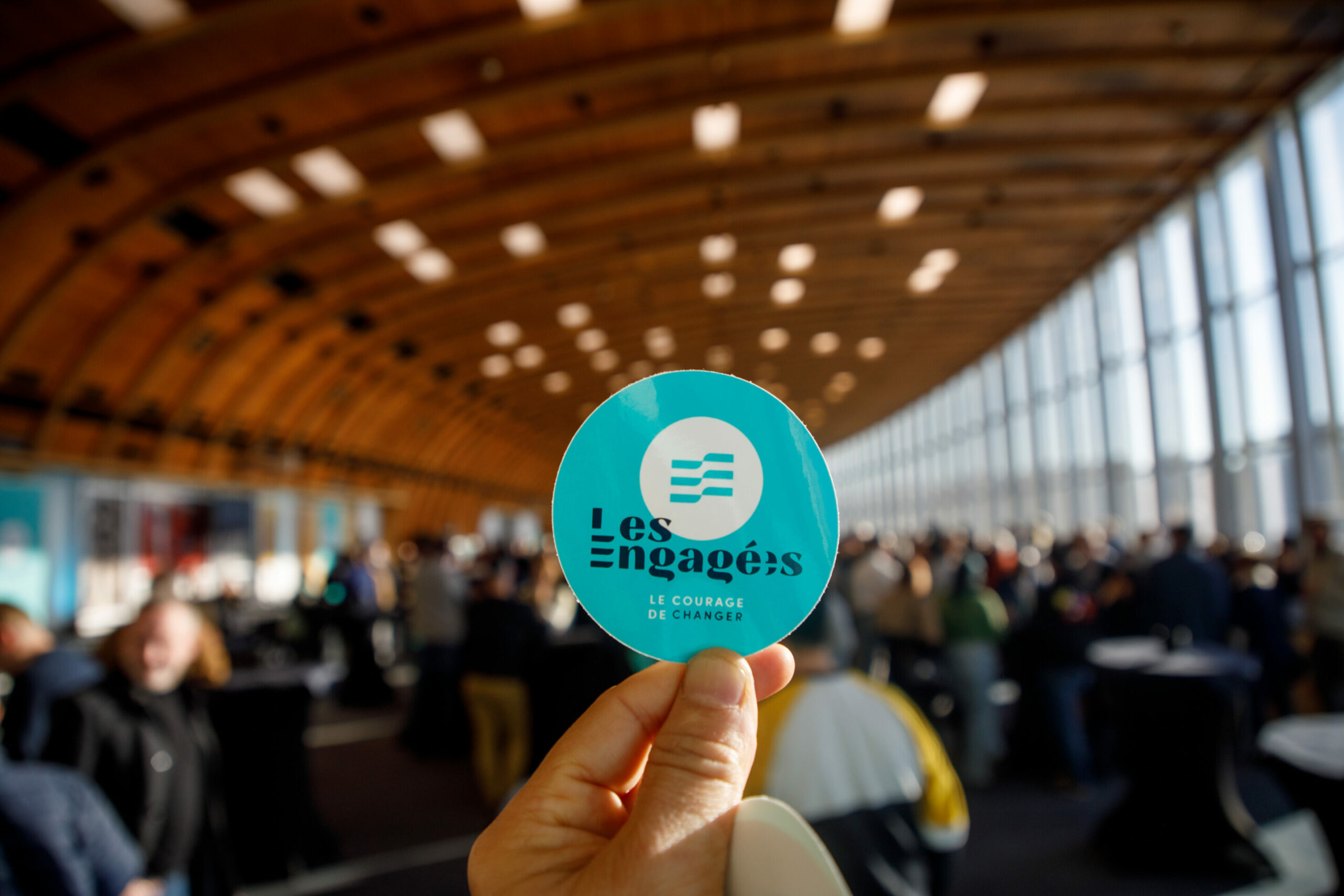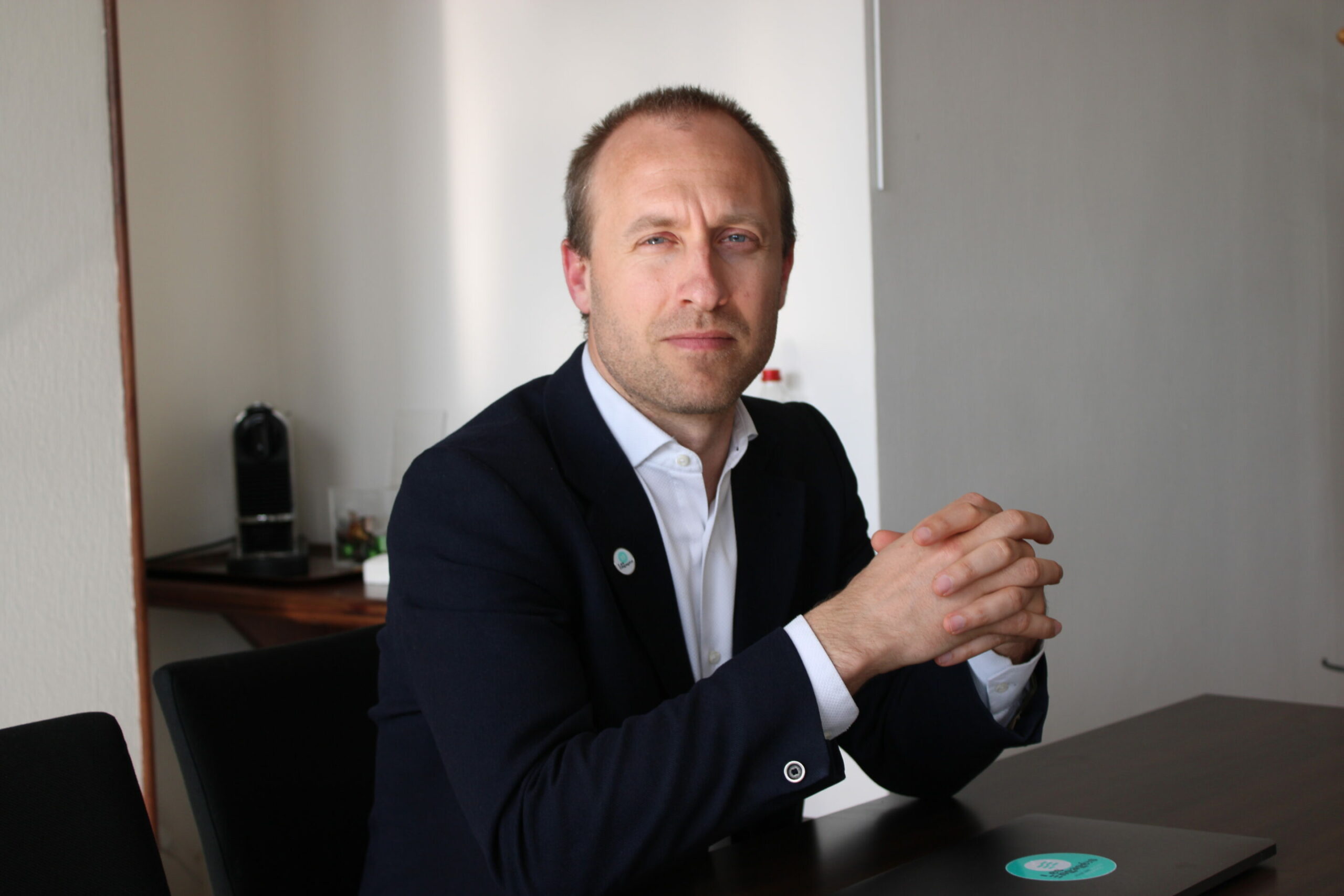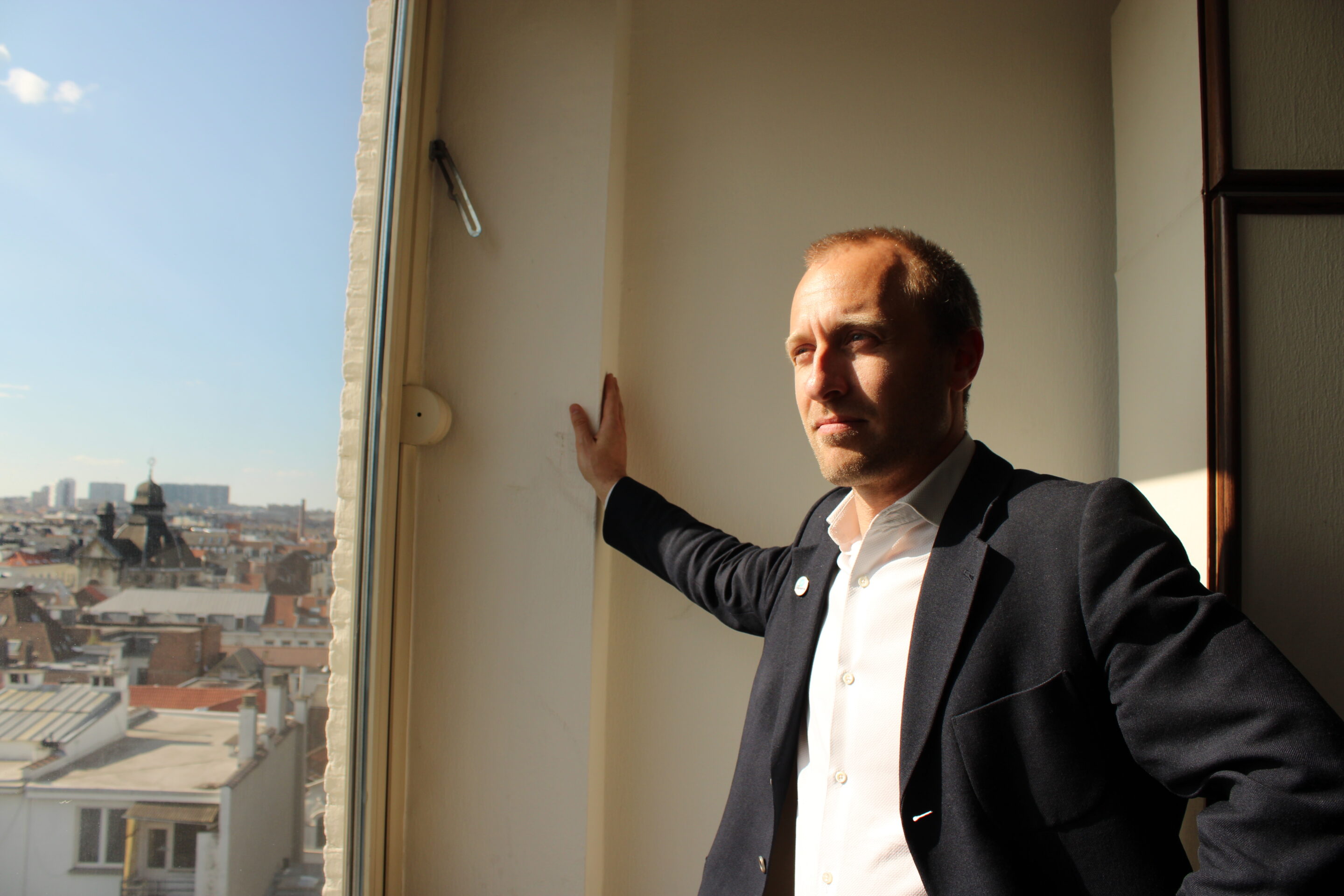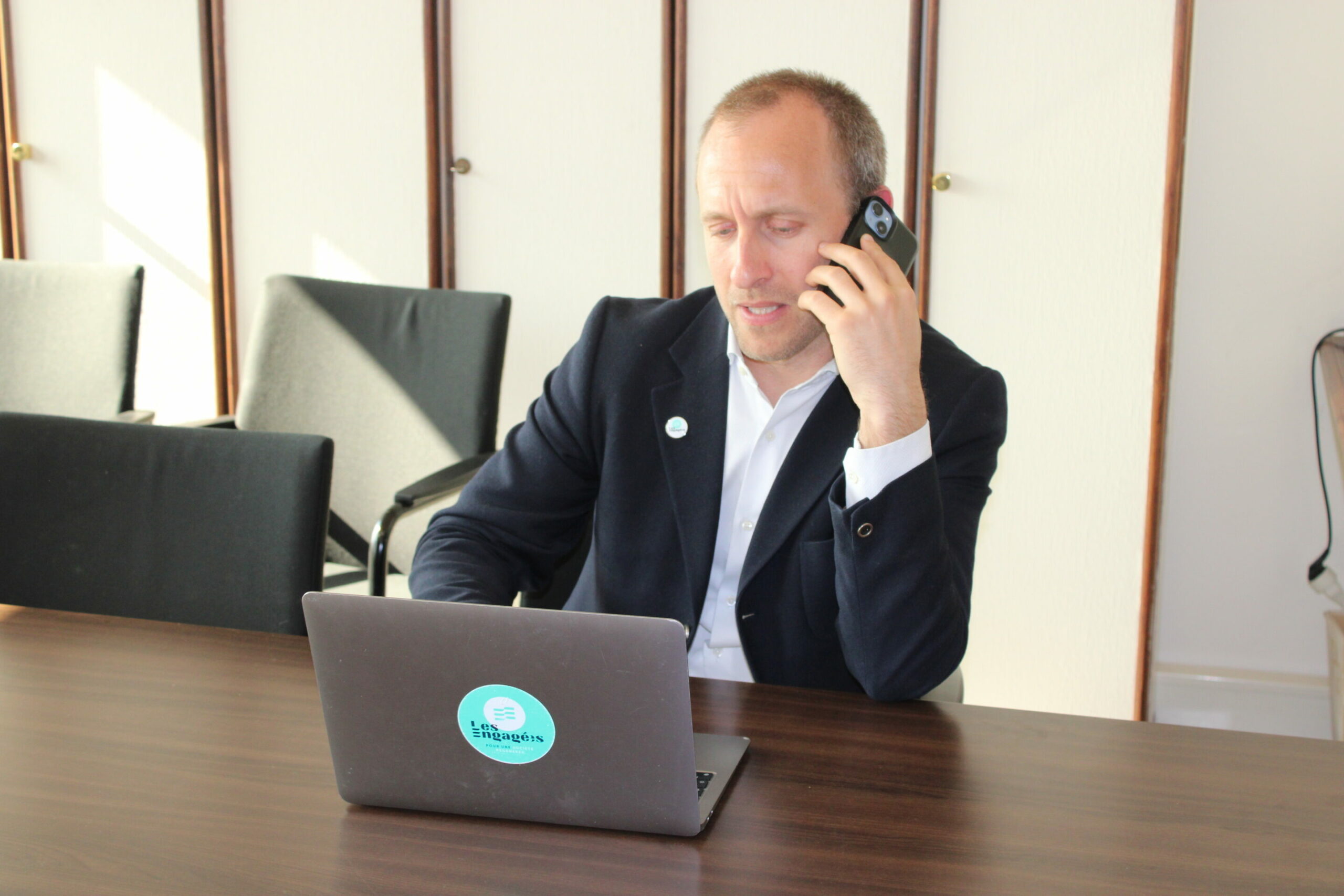One of Belgium's electoral success stories in 2024 was the re-emergence of the French-speaking centrist party Les Engagés, which has allowed it to stake a claim to becoming the "party of the common good" in a tense political climate.
After a name change (previously known as the Humanist Democratic Center Party—cdH) and a two-year process of reinventing itself, the party dropped its explicitly religious ties and positioned itself neither on the left nor on the right. After becoming a key party in the new federal coalition, the party is also in power in Wallonia and, eventually, Brussels.
Sitting down with The Brussels Times amid the ongoing Brussels Government formation saga, Christophe de Beukelaer, the Brussels leader of Les Engagés, stresses that his party is all about a new, engaged way to do politics. More than just a rebranding of the cdH, it positions itself as a balance point in a fragmented city. It aims to reconcile citizens with politics, but is it possible to run a campaign without clear-cut divisions?
"We can't keep using the same recipes and expect different results," De Beukelaer noted that the transformation was ideological as much as symbolic. The explicit Christian reference is gone, though some of the original values remain." We're no longer a Christian party, but we bring together everyone in search of meaning – whether religious or not, spiritual or philosophical."
Les Engagés claim the lost space of nuance in a political landscape dominated by extremes; their new stance is a categorical refusal of rigid ideology favouring pragmatic politics. 'We take the best of the left and the best of the right. We must stop living in a world of constant opposition," de Beukelaer added.

Illustration picture taken during a congress of french-speaking centrist political movement Les Engages regarding the participation in the new federal government, Sunday 02 February 2025 in Liege. Credit Belga/ Hatim Kaghat.
Inspired by centrist traditions à la française – between François Bayrou's MoDem and Macron's Renaissance – the party defines itself as 'radical in its balance': pro-economy and pro-solidarity, pro-innovation and pro-cohesion, pro-climate but against ecological dogmatism. "If people don't support ecological measures, the transition will fail. We want to do climate policy with people, not against them."
On Brussels' major regional projects, Les Engagés say they follow a clear line: efficient policy, citizen involvement, and local proximity. Metro line 3? "As it is currently designed, it's no longer viable," he adds, calling for a scaled-down and financially realistic version. Good Move? The transition is necessary, "but not at the expense of locking people into their neighbourhoods." Their solution: go back to the drawing board, start small, and launch accurate local consultations, possibly even referenda.
This participatory approach also guides their vision for Brussels' governance. They defend commune autonomy, are wary of forced mergers, and call for a reform of Brussels institutions that overlap and obstruct each other.
On topics such as euthanasia or surrogacy, De Beukelaer, without hesitation, insisted that the party offers no blanket positions. Instead, Les Engagés believe in the freedom of conscience and vote. "That's the only coherent stance in a pluralistic society," De Beukelaer argues. When it comes to political Islam in Brussels, however, the tone is unequivocal: "The secularism of the state must be reaffirmed. The problem is not religion, but radicalism and indoctrination".
A similar balancing act is seen in response to progressive cultural shifts in Belgian society. While vigorously defending LGBTQ+ rights, De Beukelaer expresses concerns over a particular form of " neo-progressive ultra-left " discourse, which he fears undermines social cohesion.

Les Engagés' Christophe De Beukelear interview with The Brussels Times. Credit: Anas El Baye / The Brussels Times
The veto democracy
De Beukelear let a loud sighed when asked about the Brussels Government formation. He quickly reiterated that behind closed doors, parties trade accusations, vetoes, and ideological red lines – all while the region grapples with social emergencies, budgetary strain, and a growing sense of insecurity and disillusionment among its residents. In this climate of institutional paralysis, Les Engagés are trying to position themselves as the 'adults in the room'.
"We're the only ones who accepted all the solutions on the table", argues De Beukelaer. "Sometimes, even when a proposal goes against our party's short-term interest, we say yes because the general interest must come first," he added.
The deadlock in Brussels is emblematic of what the party calls a broader "veto culture" in Belgian politics. But who is to blame? De Beukelaer points to PS for refusing to work with the N-VA, and to MR and Open VLD for their rigid conditions [e.g. MR refusing to work with the Belgian Workers' Party and Team Fouad Ahidar].
These political postures, dressed up as 'moral clarity,' only fuel populism and have a counterproductive effect: people look at the state of Brussels and say, "Democracy doesn't work".
Even if ideologically distant, refusing to govern with democratically elected parties is a form of political irresponsibility. "We're not talking about going into coalition with Vlaams Belang," he says."We're talking about working with the most significant democratic party in Flanders." The consequences of this political cul-de-sac are very real: delayed reforms, stagnant infrastructure projects, a worsening social crisis, Brussels streets plagued by cleanliness issues, and rising insecurity reflect a city in limbo.
Yet party rebuilding seems to be prioritised over governance. "Some want to stay in the opposition to prepare their comeback," the centrist leader claims in a thinly-veiled jab at Ecolo. "Others care more about internal power struggles than the people of Brussels."
"We're not naïve" he adds. "But someone has to break the cycle of blockages, egos, and exclusions. Otherwise, Brussels (and Belgium) will sink deeper into dysfunction."
Reaching out to expats
Aware of the large expat population in Brussels – a demographic often overlooked by regional politics – Les Engagés supports publishing programmes in English.
He also believes in granting voting rights to EU and non-EU citizens (34% of potential voters in the 19 Brussels municipalities according to the Belgian Interior Ministry in 2024) residing in Brussels for several years. According to him, democracy should include everyone, but it's also fair to expect newcomers to try to learn French or Dutch.
In almost every news story about government formation, democracy seems paralysed by gridlock and threatened by populist tides.
Despite their polished communication and calls for a 'politics of the common good'. Christophe De Beukelaer hints that the biggest challenge is engaging citizens in a city saturated with political fatigue. Although his party is making a bold wager: to reject binary oppositions. Their discourse can lack boldness, especially on structural issues like institutional reform and housing inequality.
But in a city like Brussels, where inequality is getting worse and societal growing fractures – drivers and cyclists, locals and expats, francophones and Dutch-speakers – governing requires more than goodwill, it demands cooperation, courage and a willingness to confront uncomfortable truths.
For readers unfamiliar with how the Brussels Government is formed, this explainer offers an accessible overview.


